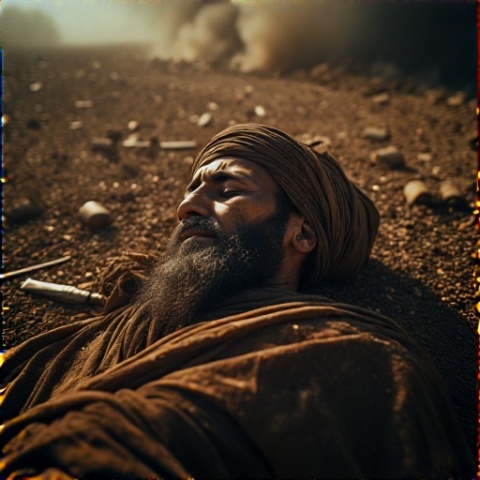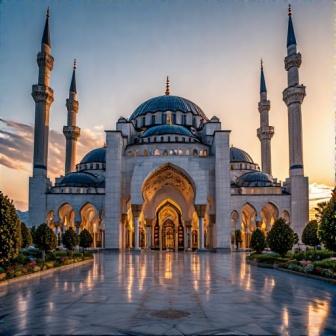Death is a universal reality that evokes both fear and contemplation. In Islamic teachings, however, death is not merely the end of existence but a profound transition—an emancipation from the trials and pains of this temporary world and an entry into the eternal life promised by Allah (SWT).
The Islamic View of Death: A Gateway, Not an End
Islamic doctrine views death as the separation of the soul from the body and the commencement of a new phase of existence. Rather than a termination, it is a passage from the fleeting nature of dunya (this world) to the everlasting reality of the akhirah (the hereafter).
“God takes the souls at the time of their death and those that die not during their sleep; then He withholds those on whom He has passed the decree of death and sends others back until an appointed term; most surely there are signs in this for a people who reflect.” (Qur’an 39:42)
This verse encapsulates the Islamic understanding: death is a divinely appointed transition, not annihilation.
Life as a Test: The Role of Pain and Trials
From the Islamic perspective, worldly life is a test. Its joys and sorrows, pleasures and pains, are all means by which the soul is refined and prepared for what comes next.
“Every soul will taste death. And you will only be given your [full] compensation on the Day of Resurrection. So he who is drawn away from the Fire and admitted to Paradise has attained [his desire]. And what is the life of this world except the enjoyment of delusion.” (Qur’an 3:185)
Pain and trials are not punishments but opportunities for growth, purification, and drawing closer to Allah (SWT). The Prophet Muhammad (PBUH) said:
“No fatigue, nor disease, nor sorrow, nor sadness, nor hurt, nor distress befalls a Muslim, even if it were the prick he receives from a thorn, but that Allah expiates some of his sins for that.”
— Sahih Bukhari, Book 70, Hadith 545; Sahih Muslim, Book 32, Hadith 6242
The Soul’s Journey: From Barzakh to Resurrection
Islamic teachings describe the journey of the soul in stages:
The Moment of Death
At the moment of death, the Angel of Death (Malak al-Maut) appears. For the righteous, the soul is taken gently, accompanied by angels bearing fragrances from Paradise. For the wicked, the extraction is painful and terrifying.
Barzakh: The Intermediary Realm
After death and before the Day of Resurrection, souls reside in barzakh, an intermediary state where they experience comfort or torment according to their deeds.
“Behind them is a barrier until the Day they are resurrected.” (Qur’an 23:100)
Resurrection and Judgment
On the Last Day, all souls will be resurrected for judgment. Each person’s deeds will be weighed, and ultimate justice will be served.
“We shall set up scales of justice for the Day of Resurrection, so that not a soul will be dealt with unjustly in the least…” (Qur’an 21:47)
Emancipation Through Death: From Temporary Pain to Eternal Joy
For believers, death is emancipation from the limitations, pains, and temptations of this world. It is the doorway to eternal life, where true and lasting joy awaits those who have lived righteously.
“He whose last words are: ‘La ilaha illallah’ (There is no true god except Allah) will enter Jannah.”
— Riyad as-Salihin, Hadith 917
The Prophet Muhammad (PBUH) and his companions (RA) viewed death with hope, not dread. The righteous are described as welcoming death, knowing it brings them closer to their Lord and everlasting peace.
Common Questions About Death and the Afterlife in Islam
1. What happens immediately after death?
The soul is taken by the Angel of Death and enters the realm of barzakh, where it experiences a foretaste of its ultimate fate based on its earthly deeds.
2. Is death painful for everyone?
For the righteous, death is gentle and peaceful; for the wicked, it is described as painful. The process reflects the soul’s spiritual state.
3. Will we meet our loved ones in the afterlife?
Islamic tradition holds that righteous souls will be reunited with loved ones in Paradise, enjoying eternal companionship and bliss, by Allah’s mercy.
4. Can we benefit the deceased after their death?
Yes, acts such as charity, dua (supplication), and seeking forgiveness on their behalf can benefit the deceased, as taught by the Prophet Muhammad (PBUH).
5. How should Muslims prepare for death?
By living a righteous life, seeking forgiveness, fulfilling obligations, and maintaining faith in Allah (SWT) and the Hereafter, Muslims prepare for a good end and eternal reward.
Applying These Teachings Today
In a fast-paced, materialistic world, the Islamic view of death as emancipation offers profound comfort and perspective. It reminds Muslims that life’s hardships are temporary, and enduring them with patience and faith leads to eternal reward. This understanding helps modern Muslims:
- Cope with loss and grief by focusing on the promise of reunion and eternal life.
- Prioritize spiritual growth and ethical conduct over fleeting worldly pleasures.
- Face personal trials with resilience, knowing they are means of purification and elevation.
Conclusion: Embracing Death as the Beginning of True Freedom
Death, in Islam, is not to be feared but understood as the moment of true emancipation. It is the release from the confines of worldly pain and the gateway to eternal joy for those who believe and strive in righteousness. The Qur’an and Sunnah urge us to prepare for this journey, not by shunning life, but by living it with purpose, patience, and faith.
“Wise is the one who prepares for the life after death, which is eternal.”
Let us live with the awareness that every trial is temporary, every joy is fleeting, and the real, everlasting life awaits us beyond this world. May Allah (SWT) grant us a good end, ease in the hereafter, and the ultimate emancipation in His eternal paradise.







